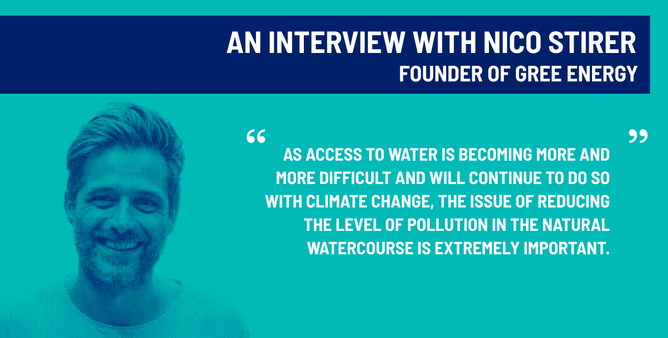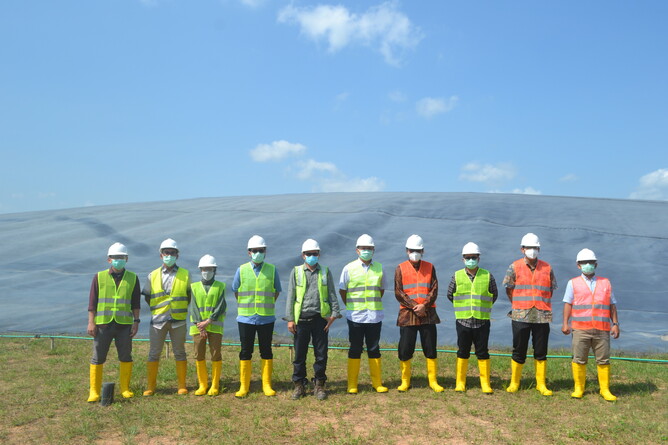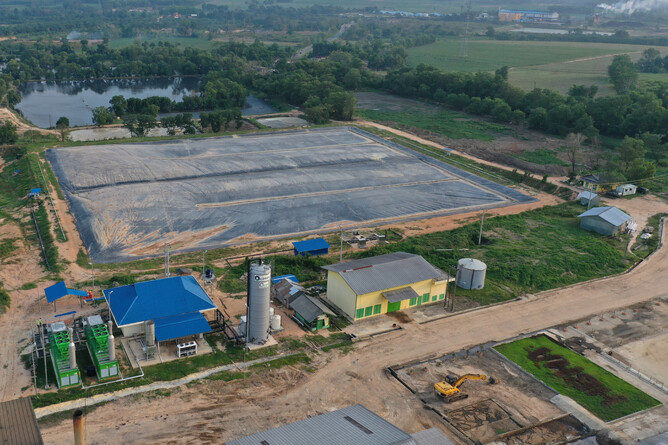Nico is CEO and Founder of GREE-Energy, a Water Unite Impact investee. He has 20 years of experience in developing biogas and renewable energy assets in Europe and Southeast Asia. Before founding Gree Energy, he spearheaded renewable energy projects with EON Masdar, the German utility giant and the largest renewable in the Middle East. He moved to Southeast Asia in 2008 as Technical Director for Bionersis, a leading global biogas company delivering 15 million certified emission reductions over 10 years under the Kyoto protocol mechanism carbon market
Q. What was the vision you set out to achieve through GREE Energy?
A. Everybody knows that food is fundamental to life. Paradoxically, the food systems that produce what we need to survive pose one of the greatest threats to life. The agriculture and food supply chain is responsible for more than 30% of global GHG emissions. And things will only get worse: the past two decades have seen a dramatic increase in demand for agricultural commodities (+48% between 2001 and 2018, growing at more than twice the rate of increase in the human population) and about 63% of this rise in global agricultural production came from tropical regions, where the environmental regulatory pressure is lower. Food production need to change attitude globally. Companies need to reconnect with the ecosystems they depend upon, at scale.
At the same time, the agriculture and food supply chain, because it’s close to nature, has everything to succeed in this transformation and to become a role model in circular economy: their waste can become resources and feed a productive and regenerative business model. Biogas deployment is a great example of such opportunity. Not only it allows to treat its wastewater and avoid the related methane emissions, but it can transform it in natural fertiliser and clean energy, re-feeding the whole system and surrounding communities. More than 90% of the wastewater in low income countries remain untreated. In a country like Indonesia, where GREE works, food industry generates a water pollution 320 M population-equivalent and that water pollution, in its turn, emits methane gas for about 50 million tonnes of CO2 eq. Treating this industrial wastewater and capturing the methane produced would allow the generation of more than 40 TWh of clean and affordable energy, enough to provide reliable power and fuel solutions all year long to more than 10 million people in underserved rural communities.
The technology to achieve that is proven and already mainstream in developed countries. Solving this problem is only a deployment and profitability issue. Now imagine if these solutions were financially viable, if every food processor globally was equipped.
GREE Energy empowers food processors in emerging countries to deploy biogas solutions that treat industrial wastewater and significantly reduce methane emissions. We make biogas solutions financially viable by unlocking access to proven technologies, carbon credit revenues, green finance and clean energy markets. GREE Energy makes decarbonization for agriculture and food supply-chains happen at scale.
Q. How does the work you do to reduce and transform waste create impacts in the water sector?
A. Indonesian watercourses are often used by humans and their cattle to wash, play, drink. Most of the time, the water pollution is the main complain we receive from the local communities who live close to food processing facilities. As access to water is becoming more and more difficult and will continue to do so with climate change, the issue of reducing the level of pollution in the natural watercourse is extremely important.
By protecting the underground water in our facilities which are all covered with a bottom liner unlike the baseline practice, we also improve the quality of the drinkable water in the area.
Q. Why are you raising impact investment as opposed to grants?
A. In a country like Indonesia, which we know best, deploying adequate biogas technologies at scale will require an investment of 2-5bn $ by 2030. And this is just one country while the issue at stake is global. The power of the market is an essential force to mobilise such massive investment. We use business as a force for good.
That said, impact investment and grants aren’t opposed. We also partner with prominent grant donors such as the SCAF and the FFEM.
Q. How is GREE Energy playing a role in improving water pollution levels in Indonesia?
A. Each food processor we partner with, typically generates as much water pollution as 300,000 to 400,000 population-equivalent. The technology we deploy treats up to 99% of such pollution. As a recognition of our contribution, GREE received a B20 Sustainability Award in the Clean Water Small Medium Enterprise (SME) category, as part of the G20 forum which was held in Indonesia.
The solution is proven and recognised, but to really make an impact what is needed is scale. That’s why impact investment is crucial.
Q. What do you see on GREE Energy's roadmap over the next 5 years?
A. We are now at a stage where we are ready to scale up in Indonesia, where we started our operations. In parallel to this growth, we will start expanding in 2023/2024 to new geographies which share the very same issues: other countries in Southeast Asia, East Africa, Central America.
Another key aspect of our growth will be to engage food consumer brands in our initiative. For the past decade, enormous emphasis has
been placed on companies taking responsibility to remove deforestation from their supply chains. While there is absolutely no doubt that greater private-sector ambition to tackle deforestation is needed, a more global approach on GHG emissions, and in particular methane emissions, is equally needed. Reconnecting companies with the ecosystem they depend upon isn’t only true for upstream food processors in emerging countries. The whole supply chain engagement is needed to transform climate ambition into action. It’s time to put money where our mouth is.



